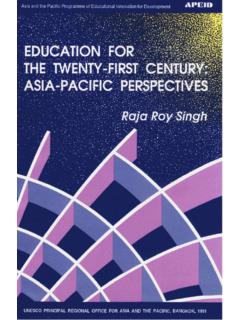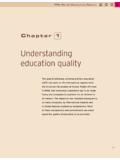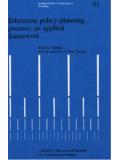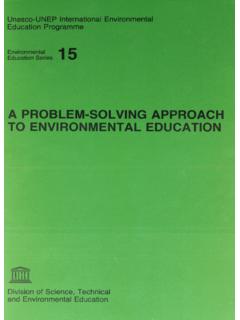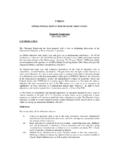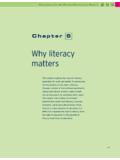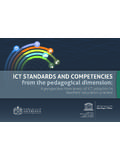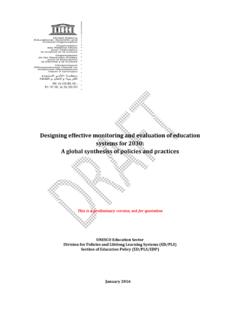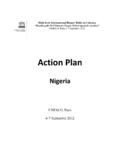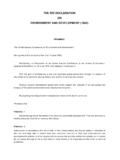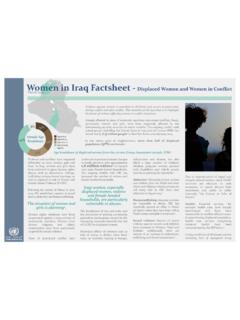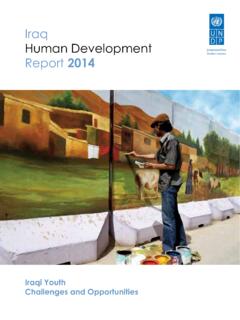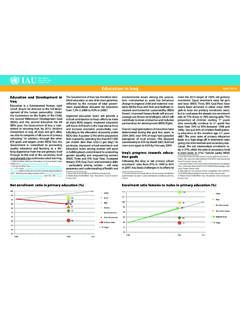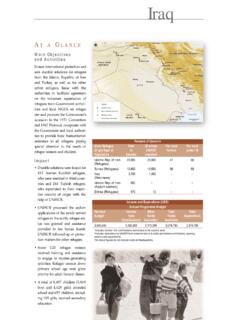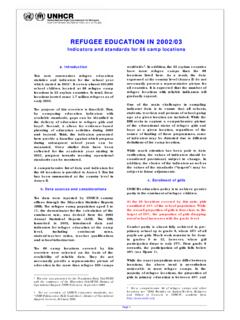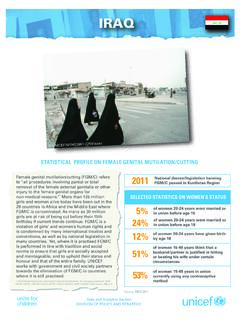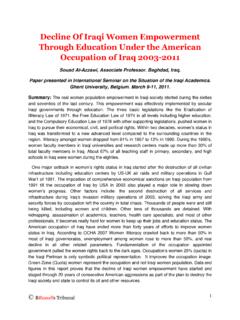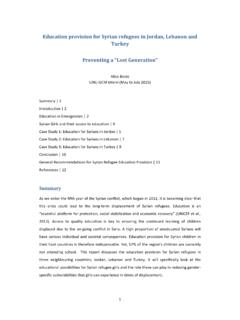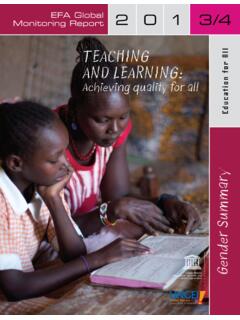Transcription of Promoting Gender Equality in Iraq - UNESCO
1 Promoting Gender Equality in iraq UNESCO s programming in regions of active or post conflict aims to increase knowledge and understanding concerning the transformations that occur in Gender relations during and after conflict, and to ensure the protection of women s rights, and their full participation in peace-making, conflict resolution and post-conflict reconstructioni. Through its continuous focus on mainstreaming of Gender Equality across its programming, UNESCO contributes to the objectives laid out within Security Council Resolution 1325 for linking women to the peace and security agenda in iraq . Since real and lasting peace and security can only be attained when the root causes of conflict, including persistent inequalities, are addressed, UNESCO supports the inclusion of both women and men from all groups in iraq in its sponsored activities, thereby ensuring that multiple perspectives are available to enrich programming.
2 By focusing on building capacity of its governmental and civil society partners to identify and address inequalities, UNESCO helps ensure that girls and women, as well as boys and men - especially those from most vulnerable groups - have a role in the reconstruction of their nation. As Gender Equality also concerns men, UNESCO is increasingly focusing on the role of men and boys with regard to Gender Equality in iraq . education Achieving Gender Equality in education carries with it strong human rights implications and without it, development agendas across the globe will not succeed. It is an investment that pays high returns because quality education for girls and women has been shown to improve livelihoods and enhance civic engagement and responsibilityii.
3 Although Gender parity has improved in the last decades, many countries are still struggling with high inequality in both access to and quality of education . iraq is believed to have the highest illiteracy rate in the region, with an estimated 18 20% of the population, (and of Iraqi women) being functionally illiterateiii. Rural dwelling women are amongst the most affected populations in iraq , with less than 50% of women aged 15-24 found to be literate, compared with 72-80% for their counterparts in urban areasiv. The post-conflict context of iraq has contributed to the current situation through destroyed infrastructure, loss of qualified personnel and massive displacement.
4 In addition to Gender disparities, other factors such as poverty, conflict, and geographic location clearly play a role, calling not just for a focus on Gender but on multiple-vulnerabilities in the development of more inclusive systems of education . i internal document, UNESCO , The Role of Women in Peace Building and Reconciliation ii UNESCO : Gender and education - iii 2010. Literacy Initiative for Empowerment in iraq : Literacy Needs Assessment Report (2010-2015). Pg. 22 iv Ibid. PIC HERE Within its Medium Term Strategy (2008-2013) Gender Equality has been designated as one of UNESCO s global priorities. In order to assist the Organization in carrying forward its work in addressing Gender Equality including contributing to the attainment of MDG 3: Promote Gender Equality and Empower Women - the Priority Gender Equality Action Plan (2008-2013) was developed, outlining a two-pronged approach for translating UNESCO s values and commitment to work on Gender Equality with Member States into practice: (1) Mainstreaming of Gender Equality issues throughout UNESCO programming at all levels, and throughout the programming cycle.
5 (2) Building commitment, competence and capacity for mainstreaming of Gender Equality through capacity and resource development with partners. Globally, UNESCO staff is responsible for awareness and usage of these two approaches, in addition to contributing to the attainment of specific objectives related to Gender Equality laid out for each Sector within the Action Plan, contextualized for the needs and challenges of the Member States with whom they work. The UNESCO iraq Office and Gender Equality UNESCO 's Approach to Gender Equality Promoting Gender Equality in iraq UNESCO iraq has a broad portfolio of programming to support the efforts of the Government of iraq and civil society address issues of Gender Equality and further vulnerability factors within the education Sector.
6 UNESCO iraq is developing several new initiatives that aim to increase capacity within the Ministry of education and civil society to integrate Gender Equality into all levels of the education system. This programming includes further support to higher education where UNESCO has already sponsored one official from the Ministry of Higher education and Scientific Research to attend a CEDAW training course; stronger linkages between education and protection mechanisms to prevent and respond to Gender based violence; and capacity building for the mainstreaming of Gender Equality in policy and curricula.
7 Literacy and Non-Formal education UNESCO s interventions in literacy are structured within the Literacy Initiative for Empowerment (LIFE) framework. Activities that have been successfully implemented include: Literacy and life skills training for over 2,000 female illiterates through 8 Community Learning Centres. Establishment of an NGO Coordination Network for Literacy A new Iraqi Literacy Law signed into effect 8 September 2011 which includes a provision on life skills and empowerment of students, together with literacy. Preparing to release a storybook with handwritten stories submitted mainly from female learners describing how literacy programming has empowered them.
8 An Educational TV satellite channel was launched in February 2011 with programming based on the official curriculum, allowing greater educational access for vulnerable groups, such as women, and assisting educators. In cooperation with the UN Joint Team on HIV/AIDS for iraq and within the framework of EDUCAIDS, UNESCO iraq has: Developed a methodological toolkit for integrating knowledge and skills related to HIV/AIDS prevention and response by literacy and non-formal education facilitators. Within the toolkit, increased vulnerability of girls and women to HIV/AIDS has been addressed. Contributions from previous and ongoing work Technical and Vocational education and Training (TVET) Within the joint Local Area Development Project: Equipment was purchased for workshops targeting female activities, such as sewing machines and computer labs in vocational training centres.
9 Within the Improving TVET Project: Piloted disciplines in the apprenticeship system emphasized trades for females such as textile design and printing trades. Equipment purchased for the Ministry of education comprised sewing and ceramics workshops. The ultimate aim of both projects was to increase women s engagement in the local labour market. Planned Activities UNESCO iraq s work on education contributes to attainment of MDG 3 by aiming at the following outcomes: 1) National capacities strengthened to plan and implement inclusive, rights based education sector plans, policies and programmes that are Gender -sensitive and assure equitable access to education , including in the areas of literacy/non-formal education , teachers, curricula and higher education .
10 2) National Technical and Vocational education and Training (TVET) policies reviewed to ensure adequate skills for transition to the labor market for females and males. 3) Quality of secondary education enhanced to expand equal access and ensure retention of girls and boys. 4) Enhanced capacity of the education system to respond to HIV and AIDS in a Gender sensitive manner. 5) Strengthened coordination and partnerships with national and international organizations to ensure holistic programming on Gender Equality . Promoting Gender Equality in iraq Culture As the only United Nations Agency with a mandate for culture, UNESCO plays a strong role in advocating for consideration of culture within iraq s development agenda, including dimensions of Gender Equality therein.
